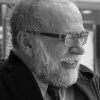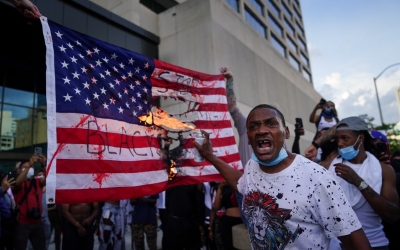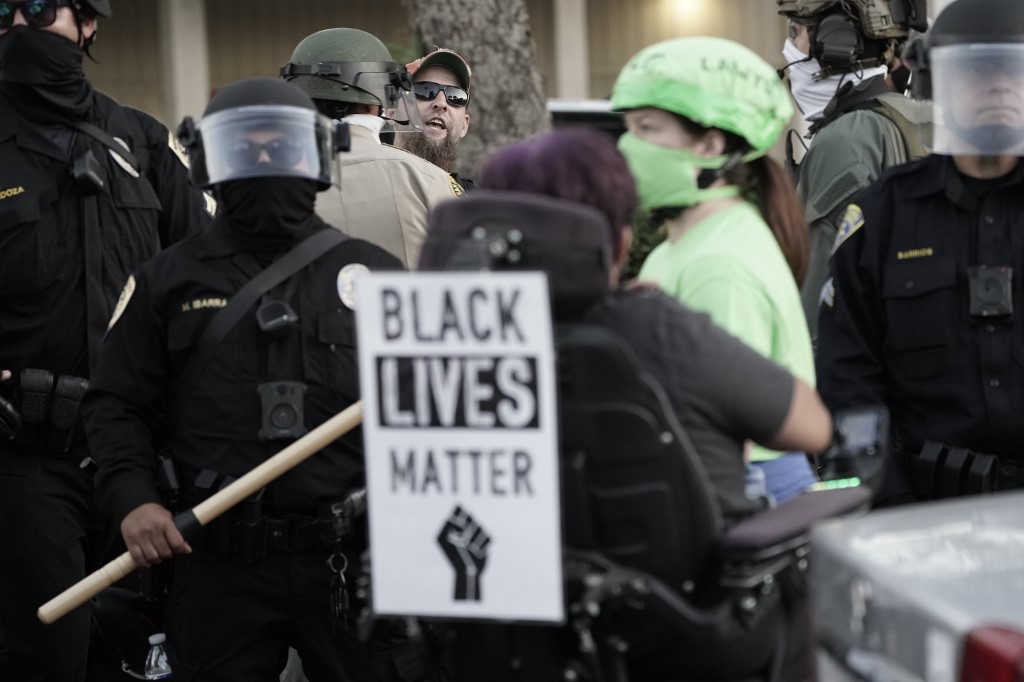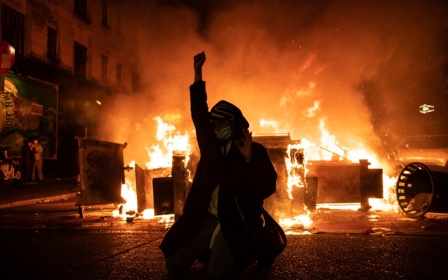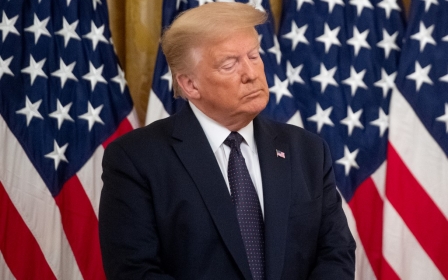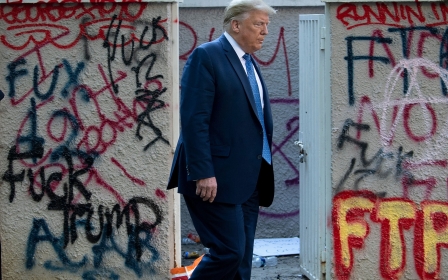Anyone for regime change in the US?
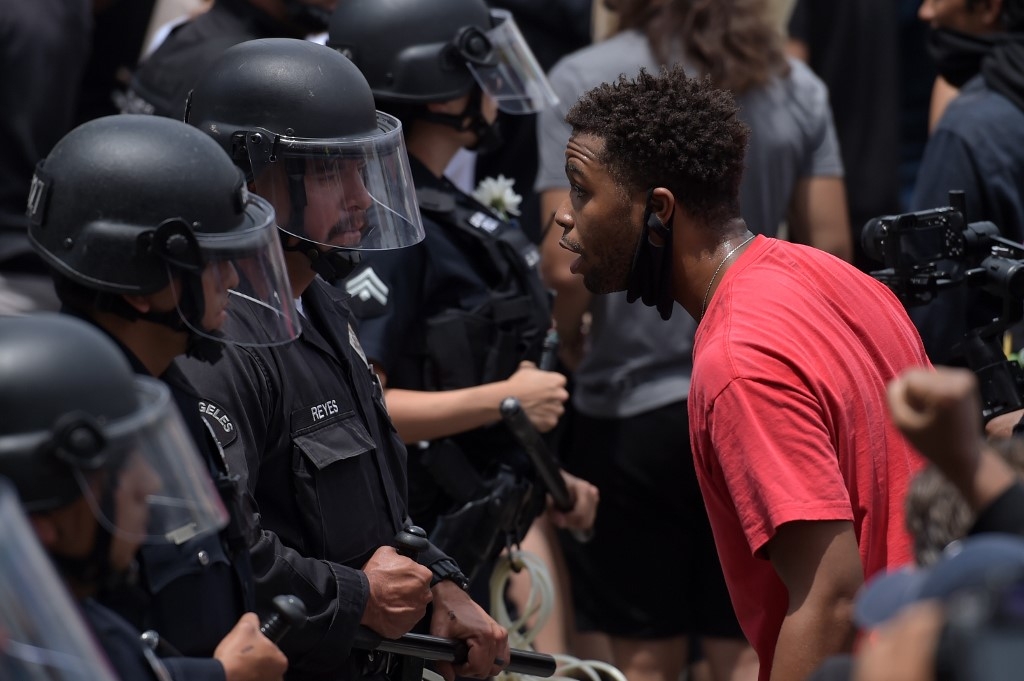
“In recent years, the international community has sounded the alarm on the deteriorating political and human rights situation in the United States under the regime of Donald Trump. Now, as the country marks 100,000 deaths from the coronavirus pandemic, the former British colony finds itself in a downward spiral of ethnic violence. The fatigue and paralysis of the international community are evident in its silence, America experts say.”
That is the opening gambit of a brilliant fictional piece that Karen Attiah, global opinions editor at the Washington Post, published in May. Reading the piece, you admire her perfectly pitched sarcasm, but you still wonder at the shameless hypocrisy of US media - not least, her own Washington Post - and American politicians and policymakers.
Whither the international community?
Just imagine for a minute if anywhere else in the world - especially the Arab and Muslim world, Africa or Latin America - a fraction of what is happening in major cities across the US, especially in the state of Oregon, were to take place. We only need to look at the crackdown in Belarus to see how the US and international community rush to condemn when similar brutality occurs elsewhere in the world.
Everyone from US President Donald Trump to the evangelical missionary crusader masquerading as secretary of state, Mike Pompeo, are seen rushing to convene the “international community”, calling for “humanitarian intervention” and even “regime change”.
New MEE newsletter: Jerusalem Dispatch
Sign up to get the latest insights and analysis on Israel-Palestine, alongside Turkey Unpacked and other MEE newsletters
The US itself is the worst case of human rights abuse, and in much direr need of 'regime change' than any other country on this planet
Yet where is that “international community” these days when it comes to grave US violations? Why does no one speak of “humanitarian intervention” in America; why no plan for “regime change”? Why should the US be exempt from a sustained and institutional course of scrutiny and condemnation for its human rights abuses?
Is this why Pompeo is so dead set against the International Criminal Court investigating US war crimes? Could the investigation into US war crimes abroad be extended to domestic human rights abuses?
What gives the US the moral authority - the political chutzpah - to even speak of “regime change” or “human rights abuses” in any other country? The US itself is the worst case of human rights abuse, and in much direr need of “regime change” than any other country on this planet.
Sure, China, Russia, India, Myanmar and Brazil could also make that list. But I have never heard any country other than the US call so frequently for “regime change” in other countries, and point fingers at their “human rights abuses”. Where does this holier-than-thou attitude come from? Who died and put the US on this high moral ground?
Murderous crackdowns
I remember vividly, during the heyday of the Arab uprising in Libya, when people were concerned that former leader Muammar Gaddafi might resort to violence against the Libyan people, that many - among them some leading Arab leftists - were anxious to talk about “humanitarian intervention” led by the US and Nato.
The same was true during the preliminary stages of the uprising in Syria and President Bashar al-Assad’s murderous crackdown against civilians.
The question is not the brutality of Assad or Gaddafi, or of Egyptian President Abdel Fattah al-Sisi or Iranian Supreme Leader Ayatollah Ali Khamenei. The question is why does anyone scarcely speak of the brutality of the “US regime” and its violations of the human rights of millions of Americans over decades and centuries?
Why is it that in Iran, Syria, Egypt, Venezuela or Cuba, we keep taking about “the regime”, but we only talk about the US “administration”?
Why, when it comes to any non-white country, whenever a major uprising against state brutality emerges, the US and its European allies - especially the UK and France - call for “humanitarian intervention”, but now, months into a massive revolutionary uprising against systemic racism in the US and widespread abuses by militarised federal forces, there is no such call?
Black Lives Matter movement
The New York Times reports that the Black Lives Matter protests “may be the largest movement in US history”. More specifically, it notes: “The recent Black Lives Matter protests peaked on June 6, when half a million people turned out in nearly 550 places across the United States. That was a single day in more than a month of protests that still continue to today.”
What has been the state response to this uprising? It has been what are justly called “Donald Trump’s storm troopers”, who have come out and brutally suppressed protests, with a ferocity reminiscent of the brutalities of the Syrian, Egyptian or Iranian security forces cracking down on those demanding freedom and democracy.
More than 14,000 have been arrested, and hundreds injured, as police forces routinely used "pepper spray, rubber bullets, tear gas and batons on protesters, media and bystanders".
Like a scene from the Costa-Gavras movie Z, Americans are watching the streets of Oregon burn in disbelief. But it is real. Militarised US security forces are doing to Americans what CIA agents had instigated the militaries in Iran, Guatemala and Chile to do to their own citizens.
“Trump Unleashes His Secret Police in Portland,” reads a headline on a piece by Jeet Heer in The Nation. It adds: “In a dangerous authoritarian move, federal agents in camouflage and without badges are rounding up American citizens.” Other American publications are screaming: “Unidentified federal officers in unmarked minivans detain Portland protesters.”
Indeed, Trump has unleashed these storm troopers. But he did not create them. They have been there, trained and armed and ready to attack, long before Trump came to power. Trump is today an easy and convenient target, camouflaging far more structural forms of state violence definitive to “the ruling regime” in the US.
Brutal suppression
These storm troopers and secret security forces that Trump has unleashed are not just brutally suppressing the uprisings in Portland and elsewhere; they are protecting and providing a safe space for their racist, neo-Nazi, KKK-without-the-hoods, right-wing kindred souls to invade and occupy places such as the Michigan state house.
These forces act in the streets of Seattle, Oakland, Chicago and Portland the way the Israeli military acts in occupied Palestine. Some US forces have been trained by Israelis. Americans in their own country are treated the same way Palestinians are in their own homeland - one by militarised police, the other by an occupying army.
The trouble is that the US is trapped inside the lies and illusions they have been telling themselves and the rest of the world
Even American political scientists are raising similar questions and concerns: “A country that cannot convince its own citizens to wear masks to halt a pandemic has no business toppling foreign governments and trying to remake whole societies that it barely understands,” Stephen Walt writes in Foreign Policy.
But his reasoning gives us a clue as to where the problem lies: “Lacking knowledge of local customs and values (let alone a substantial number of officials who can even speak the local language), the would-be nation-builder is unlikely to pick the right leaders for key positions or to design new institutions that will be legitimate in the eyes of the local population. Its efforts to build local institutions and infrastructure to boost the economy inevitably fuel corruption and produce enormous unintended consequences.”
The very idea of regime change is evil not because Americans are ignorant of local customs and values, or even the languages of the peoples they invade and conquer. Fields such as Orientalism or anthropology were invented to manufacture the kinds of knowledge about these countries that would justify and facilitate conquering them.
Imperial hubris
We, the “local populations” of these countries, know only too well what democracy means and how to be responsible citizens of a legitimate democracy.
But precisely for that reason, through one military coup after another and one act of settler-colonialism after another, these regime changers have made sure we will never even entertain the illusion that we can manage to rule ourselves.
The trouble is not with this imperial hubris of not knowing our languages and cultures. The trouble is that the US is trapped inside the lies and illusions they have been telling themselves and the rest of the world.
“American exceptionalism” forbids the world from seeing the US for what it is: a terrorising adventure of settler-colonialism that gives rise to an imperial killing machine, both at home and abroad.
The views expressed in this article belong to the author and do not necessarily reflect the editorial policy of Middle East Eye.
Middle East Eye delivers independent and unrivalled coverage and analysis of the Middle East, North Africa and beyond. To learn more about republishing this content and the associated fees, please fill out this form. More about MEE can be found here.


